The Baby Broker Project: Inside the world’s leading low-cost surrogacy agency

One of the world’s most successful low-cost surrogacy agencies, New Life, presents itself as a dream solution to the nightmare of infertility suffered by desperate would-be parents across the globe.
Against a visual backdrop of beaming couples hugging cherished babies, New Life’s website promises “a solution for everyone".
For as little as $40,000 — less than a third of commercial surrogacy costs in the US — New Life promises to help commissioning parents achieve their aspirations. It matches them with surrogates living in countries where medical costs are low and poverty rates high, and then oversees the process to completion.
Boasting a “world known reputation” and a “70-80% program success rate”, New Life claimed in 2018 to have been responsible for more than 7,000 surrogacy births around the world in its first ten years. Since then, it has been growing even faster, arranging the transfer of 80-100 embryos a month into surrogates’ uteruses, as reported to news media.
But a major investigation by an international team of journalists from four continents has unearthed evidence of suspected ethical violations regarding the company’s recruitment and treatment of surrogates, and an opaque company structure that issues what some lawyers argue are worthless contracts, which could leave potentially vulnerable women and commissioning parents legally exposed.
Our investigation, a collaboration known as The Baby Broker project, involved journalists from Animal Politico in Mexico, iFact in Georgia, The Observer from the UK and Eesti Päevaleht from Estonia. Freelance reporters from Kenya and Cambodia also took part. The project was coordinated by Finance Uncovered and supported by funding from the Pulitzer Center.
New Life’s global website claims that the agency is “headquartered in Great Britain”. But official company records for the agency’s only British company, New Life Global Network LLP (NLGN) — which issues contracts to commissioning parents — appear to show a shell company registered at a London mail-forwarding address. It has no fixed assets, office or directors.

More than 4,400 companies are registered to an office in College House, in Ruislip, west London, the address NLGN gives as its London headquarters. Many of them appear to be shell companies (Photo: Google)
Until confronted by a member of our investigative collaboration in Georgia earlier this year, NLGN had declared its owner as a Georgian national who was in fact employed as an airport driver, and who we discovered has a recent conviction for the manufacture of a synthetic street drug Alpha-PVP, also known as Flakka.
Three legal experts who reviewed a draft contract provided by NLGN to commissioning parents in the UK said they believed that the document was unlawful. It is illegal for for-profit agencies to engage in promotional activities or negotiations in the UK concerning surrogacy arrangements, regardless of whether the eventual surrogacy is to happen in the UK or overseas.

New Life exhibiting at conferences in London, Montreal and Guangzhou (Source: New Life websites)
All surrogacy agreements are unenforceable in UK law, the lawyers also pointed out. Other countries similarly ensure that such contracts cannot be enforced in the courts, though some jurisdictions — notably the US, Ukraine and Georgia — have laws that do recognise commercial surrogacy contracts.
This means that commissioning parents and surrogates—especially those recruited from countries where surrogacy is unregulated—would potentially have no access to legal recourse against the company should something go wrong during the surrogacy process.
Shown a copy of one draft contract between UK-registered NLGN and a potential New Life customer based in Britain, Kirsty Horsey, a reader in law at University of Kent, said: “The terms of the agreement are: you will find me a surrogate and I will pay you money for it – which is still a criminal activity on their [New Life’s] part.” Horsey is also senior research associate at London Women’s Clinic and a specialist in surrogacy.
Emily Jackson, a professor of law at the London School of Economics, said: “This contract looks really concerning to me. The ownership issues sound worrying too."
And while the reporting team found several instances of surrogates being satisfied with these arrangements because they provided them with vital income, our investigation has highlighted serious areas for concern – some that may be unknown to commissioning parents.
Our investigation found that some New Life surrogates, tempted by life-changing amounts of money, signed up to undergo risky pregnancies in jurisdictions where surrogacy is often unregulated. These women agreed to become surrogates seemingly without the benefit of legal support, potentially leaving them open to exploitation and abuse.
Several who worked with New Life, its affiliates or who were treated by the international chain of IVF clinics owned by one of its founders, claimed they never received copies of their contracts at all.
These include three surrogates in Kenya as well as a garment-factory worker in Cambodia whose surrogacy led to her being arrested for attempted child trafficking. In addition, journalists also spoke to a domestic-abuse survivor in Georgia who saw surrogacy as the only pathway to financial freedom from her abusive ex-spouse.
Reporters also reviewed NLGN’s records at Companies House, the UK’s corporate registry. These showed the owners seemed to have gone to great lengths to hide their identity, ensuring the company was controlled through two nominee firms on a remote atoll in the Marshall Islands, a corporate secrecy haven in the Pacific Ocean.
When the UK introduced transparency laws in 2016, requiring all companies to publish the names of their ultimate owners, NLGN failed to comply. For four years, it sent Companies House paperwork which seemed designed to hide the identity of the company's ultimate owners.
Eventually, in 2020, NLGN declared its owner to be 40-year-old Irakli Khvichia, the airport driver with a recent drug conviction, from Kutaisi, a city in the Republic of Georgia.
When a journalist tracked Khvichia down in early October this year, they found him 150 miles away, in the Georgian capital of Tbilisi.
The reporter introduced herself to him in the street and he agreed to be interviewed as he walked to his car. He confirmed he was the owner of NLGN, but said he was unable, at that moment, to answer questions about the company. He would do so later, he said – an offer he subsequently withdrew.
“I'm just in a hurry. I'm on a run, I'm on my way to western Georgia. It would be better if we met each other in a different situation. Good luck, good bye. I’m sorry, I’m in a hurry, I have to go.”

iFact reporter Natia Mikhelidze interviews Irakli Khvichia about his ownership of NLGN in Tbilisi. October 2022 (Filming: iFact)
He suggested many questions should not be put to him, but to staff at New Life offices in Tbilisi.
“Go to Bakhtrioni street, my beautiful, and they will give you the answers to everything,” he told the journalist. “If my involvement is necessary, I won’t hide, I promise. I’ll appear.” Khvichia did not answer further questions asked by phone or text.
Less than a week after the confrontation with reporters, New Life Global quietly filed paperwork with Companies House declaring that Khvichia was no longer the ultimate owner.
New Life did not answer questions about Khvichia or about the enforceability of contracts issued by the British company NLGN, which it said “acts as an international marketing and promotion tool” for various companies under the brand New Life operating legally in many jurisdictions.
“Due to the limited functions of the company in respect of marketing and promotion, the ownership structure has been simplified by top management,” it said.
A Brave New World
New Life is at the vanguard of a booming offshore trade in low cost surrogacy services.
The global proliferation of in vitro fertilisation (IVF) techniques – that is, the ability to fertilise an egg outside of a woman’s body, in a laboratory – has combined with cheap air travel and online marketing and recruitment opportunities to create the perfect environment for low-cost surrogacy agencies to flourish.
New Life first opened its doors as a medical tourism agency specialising in surrogacy in Tbilisi in 2008. Within two years, it had added branches in Ukraine and India. Today, it says it has operations in numerous countries across four continents. It claims to have helped customers from 73 countries.

New Life on Twitter, 2018
From the outset, New Life’s promotional efforts were aimed at infertile would-be parents in affluent countries where commercial surrogacy was banned because their governments believed it would result in the exploitation of vulnerable and financially desperate women. Most of the European Union, Canada, Australia, the UK and China have outlawed commercial surrogacy.
What these restrictions have not done is stem demand: A 2020 industry report by Global Market Insights found the global surrogacy industry to be worth $4bn, but that is expected to grow massively.
Most of this growth is taking place in jurisdictions where surrogacy is un- or under-regulated, salaries are low, and healthcare is inexpensive, creating an uneven geographical marketplace where commissioning parents drawn primarily from wealthy Western countries hire economically vulnerable women in the Global South to carry their children.
In 2014, New Life briefly opened an office on the west coast of the United States, in California, where commercial surrogacy is both permitted and regulated. Because of these regulations and the high price of medical care in the US, the cost of commissioning a surrogate mother to bring one baby to term – including agency fees, legal and medical fees and the cost of an escrow account – ranges between $120,000-$230,000, according to various industry estimates.
On its US website, which is no longer active, New Life pressed the case for North American would-be parents to travel overseas, where surrogacy agreements were available for a fraction of the price: as little as $40,000-$45,000 (without egg donation), according to estimates on their Mexico-facing site.
“We believe that everyone deserves the chance to enjoy parenthood and financial limitations should not be a barrier,” New Life’s US website said. “Therefore, we strive to keep our program costs as low as possible and offer a choice of destinations to our Intended Parents.”
Though New Life no longer directly pushes surrogacy tourism packages in the US, other marketing firms still promote the agency to American would-be parents.
An offer she couldn't refuse
Tempting as this may be for commissioning parents, low-cost surrogacy often come with hidden risks – typically for the surrogate mother.
To meet demand, New Life is constantly searching for women willing to act as surrogates. Since it started, the agency has recruited thousands – many of them poor single mothers living in low-income countries in Eastern Europe, Asia, Latin America and Africa. Such women are often preferred because their ability to deliver a child to term has been proven, while the presence of a husband can complicate legal claims to parentage after the baby is born.
Adverts have appeared in bus stations and newspapers as well as on Facebook and other social media. In some countries, such as Colombia and Kenya, New Life has also hired local recruiting staff. In Cambodia, some garment workers said they learned of the chance to make their fortune through surrogacy from fellow factory workers.
New Life customers are often asked to sign standard contracts that commit them to cover medical bills and pay the surrogate mother a fee of $12,500 on delivery of a baby carried to full term.
For many of these women, such compensation can seem life-changing.
New Life first arranged for the transfer of an embryo containing the genes of a Swedish couple into *Irene’s uterus just one year after the 32-year-old Georgian bakery worker’s first surrogacy with another agency had ended in the birth of twins.
In fear for her life, Irene, who requested a pseudonym for her own safety, first considered renting her womb while in hiding from her abusive ex-husband at a women’s shelter in Tblisi, Georgia. Commercial surrogacy paid more than she could hope to earn in five years, promising the financial freedom from her ex that she desperately needed.
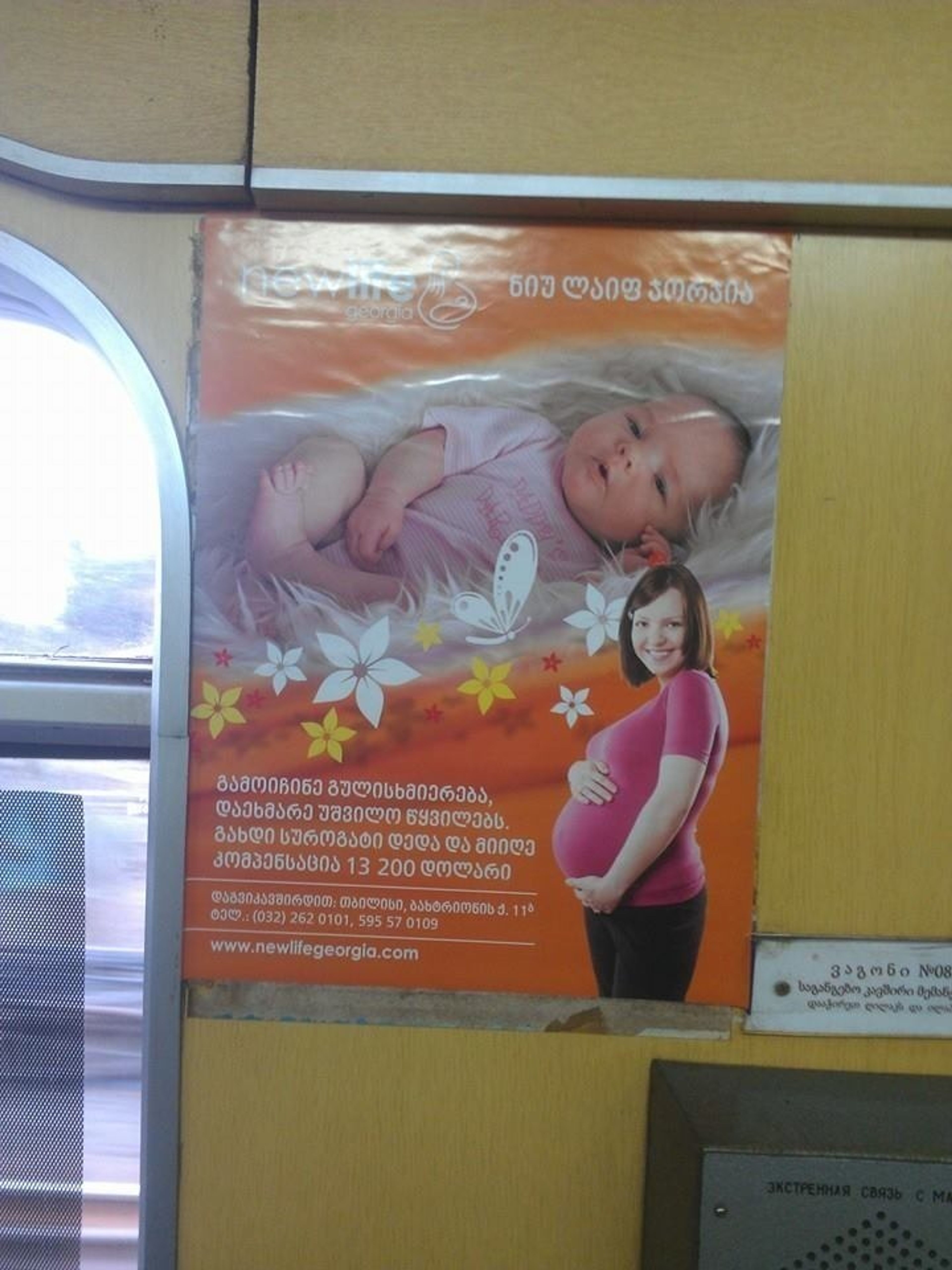
Advert seeking surrogates in Georgia
But her hoped-for second pregnancy was unsuccessful – at least at the first attempt. Doctors transferred another frozen embryo from the Swedish couple. Then another, and another. Only a year later, after nearly half a dozen embryo transfers, was the pregnancy established. She went on to give birth, by c-section, to a healthy baby.
Irene says she would have liked to have taken a third surrogacy job, but was told that her body was no longer up to the task.
She considers both experiences to have been successes, and used the money to buy and renovate an apartment that allowed her to be reunited with her own son, who had continued to live with her ex-husband after she fled.
“Surrogacy helped me a lot. I needed it more than anything or anyone, like never before needed,” Irene said. “It really helped me, how much you save, when you don't have to pay the rent. Now me and my son are happier.”
But lawyers and medical ethicists worry that such disproportionate financial incentives potentially undermine consent, leading vulnerable women to take risks they would otherwise never consider, and making them easy to exploit.
“As consent entails capacity and understanding, it’s arguable [whether], tempted by a disproportionate sum of money, an economically vulnerable woman considering surrogacy can still give clean, objective autonomous consent,” said Françoise Shenfield, a fertility specialist and the founding member of the Special Interest Group for Ethics and Law at the European Society of Human Reproduction and Embryology (ESHRE), Europe’s pre-eminent research body on reproductive medicine. “She may well disregard, or minimise the risks entailed.”
ESHRE is opposed to commercial surrogacy and supports non-commercial surrogacy only in the event of medical necessity. And even in those circumstances, she said, surrogates should undergo extensive psychological screening beforehand. She added that caesareans should be avoided unless absolutely medically necessary; and, to minimise risk to their bodies, surrogates should never be asked to carry twins or serve as surrogates more than once.
The ethics committee of the American College of Obstetricians and Gynecologists takes a more nuanced stance on commercial surrogacy, noting in a 2019 statement that “it is important to understand that a given amount of compensation may be appropriate in some social, economic and geographic scenarios and may be effectively coercive in others.”
The director of the domestic violence shelter where Irene took refuge 11 years ago said more than ten former residents had been recruited to the surrogacy industry, but she did not specify which surrogacy agencies were used. She said there was little she could do to stop them since she found out only after they were pregnant.
New Life said in a comment letter it was proud of its “worthy contribution to the cause of human importance” and had “assisted many people to overcome poverty and earn a living,” of which Irene’s experience is “proof”.
“A woman under domestic violence who took refuge in a shelter was able to make her own decision and gain the desired freedom outside of the shelter by helping a childless couple as a surrogate mother,” it said.
Most of the New Life surrogates interviewed by reporters experienced uncomplicated pregnancies and said they were happy with the compensation they received.
However, three surrogates who worked with New Life’s representative in Kenya claimed that they had not received copies of their contracts. One in Mexico claimed that she was only given a one-and-a-half-page contract that she believed to be valid, but which Mexican lawyers, on reviewing a redacted version, declared “not a valid document” and “legally unenforceable”. She may have signed additional, more official contracts, but, if so, does not remember and never received copies.
Victoria Gelfand, an Israeli lawyer specializing in international surrogacy law, explained that contracts are particularly important for the protection of surrogates, as all pregnancies carry some risk, which should be rigorously addressed for the woman’s safety.
“What happens if during pregnancy she has complications and has to go on bed rest? What happens if she dies? Is there any life insurance? Will her family get that if she dies?” said Gelfand. “What if she has a rupture? What if she needs expensive physiotherapy?”
She notes that in the absence of a comprehensive contract, a surrogate “cannot safeguard herself…at all.”
None of the New Life surrogates interviewed by our reporters had spoken to a lawyer before signing their contracts. It is unclear whether they were offered independent legal advice. New Life has also told an undercover reporter posing as a potential client that in “99% of cases” surrogates and commissioning parents are not in contact for the duration of the pregnancy.
By contrast, in the US, where the commercial surrogacy industry is well-established and legislation exists on a state-by-state level, most surrogates and commissioning parents go through a “matching process”, where they get to know one another, so that the surrogate mother is reassured that the baby she is carrying will go to a good home. This helps ensure all parties are on the same page about certain medical decisions, such as whether the surrogate would consider aborting in the event that the foetus had a genetic disorder.
Critically, US surrogates also generally have their own independent lawyer and contracts commonly run to more than 40 pages, including extensive safeguards in the event of medical complications.
According to Natalie Gamble, a UK lawyer who specialises in surrogacy cases, the role of the agency should be as a “safeguard” ensuring an equal relationship between both commissioning parents and the surrogates, so the rights of both are properly looked after.
She said that a key part of ethical surrogacy is “that there is a very close and direct relationship between the parents and the surrogate and that there is equal balance of power that everyone has going into this on a fully informed basis.”
New Life's ultimate owners
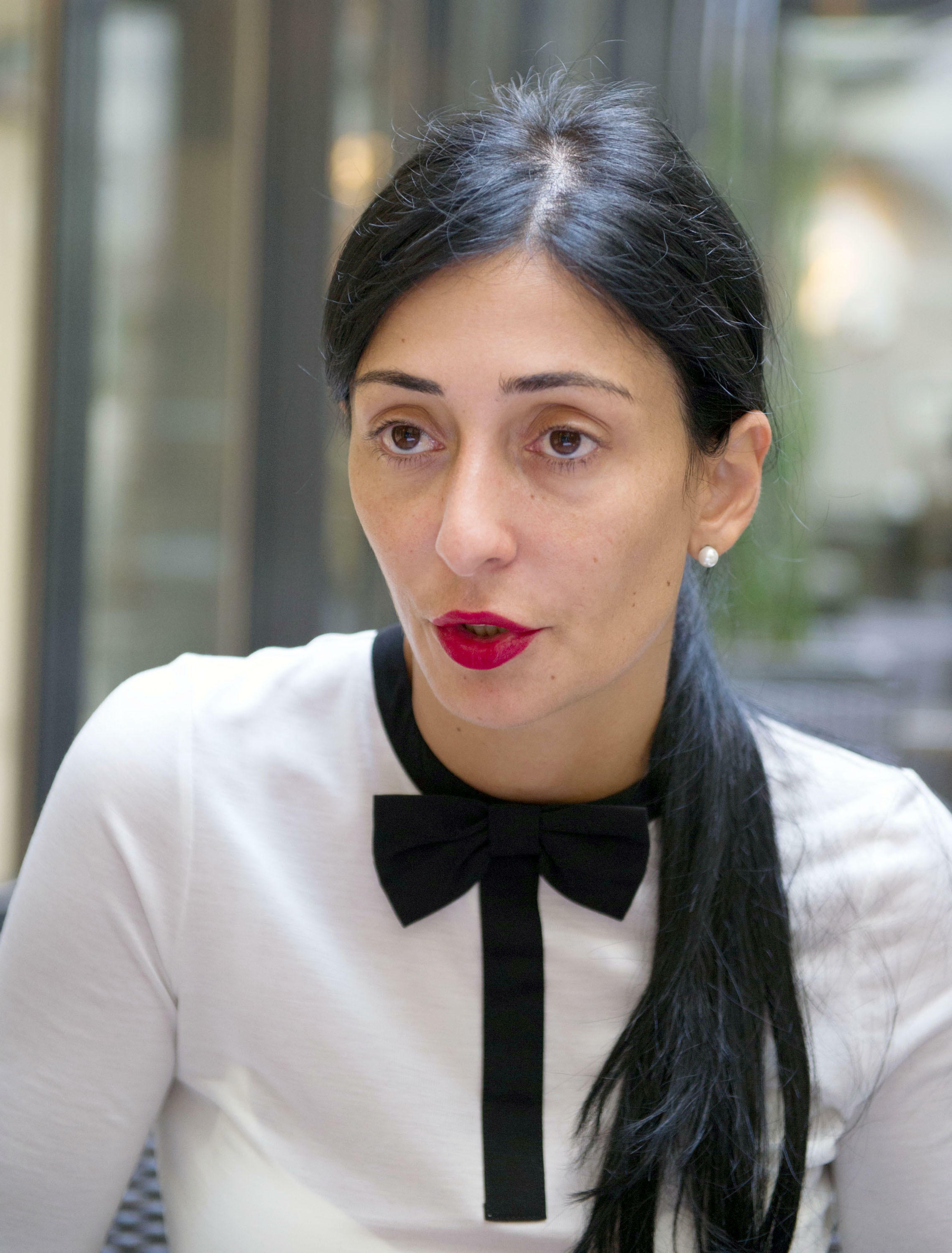
Mariam Kukunashvili in Paris in 2014 as her New Life agency was beginning to boom (Photo: Alamy)
In stark contrast to the lives of some of their impoverished surrogates, New Life's most prominent executive enjoys one of extravagance and glamour.
In Georgia and across the surrogacy industry, few people would recognise the former airport driver and logistics manager Irakli Khvichia as a New Life boss. Instead, they see its co-founder at the head of the agency, the flamboyant Georgian entrepreneur and millionaire, Mariam Kukunashvili.
Kukunashvili leads a high-profile, jet set lifestyle, appearing regularly in Georgian tabloid newspapers and society magazines, where she is portrayed as one of the country’s most successful international businesswomen, living in a luxury house built to her own design, with a dance studio and indoor swimming pool.
Her Instagram account regularly features glamourous pictures of her dressed in designer clothes, posing dramatically in luxury hotels from Venice to Mexico, London, Kenya and India.

Kukunashvili's glamorous life on Instagram
Before starting her surrogacy tourism business, Kukunashvili says she was a doctor and professional ballroom dancer.
New Life marketing material also heavily draws on Kukunashvili’s long struggle with infertility.
On its website, she writes that she finally turned to surrogacy after 11 unsuccessful IVF cycles, four surgeries and an ectopic pregnancy. In 2011, she commissioned two surrogates to carry her children, resulting in twin boys and a girl, all born the same year.
By contrast, social media posts by Khvichia, who until recently – on paper – was the ultimate owner of NLGN, show photos of him living a modest life in Georgia, along with occasional images of guns, knives, knuckle-dusters and fans of euro notes.
He was formally listed as a member of staff at Kukunashvili’s husband’s IVF clinic in Georgia, where he was described as “Logistics manager/driver”, with duties including driving new customers to and from the airport. Kukunashvili is godmother to one of Khvichia’s children.
Five days after reporters found Khvichia and asked him about his ownership of NLGN, the company filed an update at Companies House in the UK. It said that Khvichia no longer controlled NLGN, passing ownership to Kukunashvili’s husband, David Bezhuashvili.
Reporters asked Kukunashvili a raft of questions about her connection to NLGN, the company at the centre of New Life’s international operations: What was Khvichia’s connection to NLGN? Why did NLGN appear to take steps to hide its ultimate beneficial owner? Who benefited from New Life customer payments into NLGN’s bank accounts in Georgia and Latvia – Khvichia or her?
Neither Kukunashvili nor Bezhuashvili provided clarity. “I consider that it would be more valuable to focus not on NLGN, which …. has limited functions,” Bezhuashvili said.
Although Kukunashvili has always presented herself publicly as the principal decision maker at New Life, various New Life websites have described her as the “co-founder” of the agency in general and NLGN in particular.
Her fellow founder is rarely mentioned, but very occasionally New Life has named Estonian businessman Jaanus Pikani in this role. Pikani and Kukunashvili were together responsible for dealing with strategic planning, management and quality control issues, according to one NLGN document.
Asked for more details about Pikani’s role, New Life said “we had some joint projects years earlier”, adding that the Estonian was no longer a business partner.
In 2010, just two years after New Life had started up, Pikani separately teamed up with fellow Estonian Andres Salumets, a world-respected embryologist, to set up an international chain of IVF clinics, first in Georgia and India, then Thailand, Mexico and Cambodia.
In each case, the clinic businesses began working with customers of the nearby New Life surrogacy tourism branches. Sometimes the two worked from the same address. And some of the clinics businesses operated under the New Life brand name. In Mexico, India and Thailand, Kukunashvili was even a co-investor or director alongside Pikani and Salumets. At fertility trade shows, New Life staff also promoted some of the clinics.
Despite their joint projects, however, Pikani and Salumets have always insisted the clinics were entirely separate from the New Life surrogacy coordination operations. Although the clinics treated some New Life clients and surrogates, they were not involved in the surrogacy business. Salumets stepped down as a director of the clinic chain business in 2017, and full control passed to Pikani.
When reporters contacted Salumets, who served from 2015 to 2017 on ESHRE’s executive committee and currently is a professor at Karolinska Institutet, an esteemed Swedish medical research university, he said he was shocked that so many websites promoting New Life’s surrogacy business listed his name prominently as being on the agency's “team”. He said this was “criminal identity theft” and within hours he sent cease and desist letters to New Life demanding his name and medical credentials be removed.
“I have not provided any kind of assistance, advice or consultations to these surrogacy institutions,” he said in an email response. “This information was just established by stealing/copying the publicly available information about me [from another website], with the purpose to advertise the services using my name.”
Later, a New Life staff member said neither Kukunashvili nor Bezhuashvili were available to respond to the allegation of identity theft. Journalists approached Pikani, who did not want to answer questions or offer any comment.
Giving customers what they want
At its core, New Life’s main marketing message is simple: “Every responsible and caring person deserves [the] happiness of parenthood”.
Reporters found at least 16 active websites and domain names operated by New Life, many of them pushing a raft of controversial fertility treatments and surrogacy services, in more than 10 languages. Many more New Life websites are no longer active.
The agency's multiple websites around the world have allowed it to provide designer baby services to its customers with a convenience that Jeff Bezos’s Amazon would admire.
Take the case of Joseph Hahle. At 36-year-old, in 2013, he was a single, gay man, based in California, who wanted to start a family. He could not afford to work with a local clinic, but discovered New Life’s Thai branch online. “Their breakdown of costs suggested a price tag of around $40,000, if all went well,” Hahle wrote in his memoir, Making Baby Humans. “That was one-third the estimate I had received in America!”
Without Hahle having to leave the US, the agency arranged for Roxanne, an egg donor he had chosen from an online catalogue, to be flown from South Africa to Bangkok, where eggs were retrieved from her ovaries and fertilised in a lab using Hahle’s sperm, which had been frozen and shipped by DHL from California.
Back at home, Hahle uploaded two photos – one of the donor, one of himself – on to an image-morphing website in order to generate a hybrid picture of what their child might look like.
Since he already had five nieces and felt he would prefer twin boys to carry on his family name, Hahle paid New Life a premium to have the embryos screened to determine their sex and then transfer two male embryos into the uterus of a Thai surrogate. Hahle never spoke to or met this woman until after their births.
He remained in California as New Life marshalled the necessary genetic components and technical expertise for his made-to-order babies, but planned to make the trip to Thailand to witness the births. However, the twins were born nine weeks early, both weighing around 4lb, so he learned he was a father by a short email.
As well as helping single commissioning parents such as Hahle, for whom local surrogacy options are too expensive, or infertile couples looking for legal routes around national commercial surrogacy bans, New Life has found other enterprising ways to draw customers. It supplies a host of controversial services – none of which are unlawful where they take place, but some of which are illegal in commissioning parents’ home countries.
In parts of Asia, New Life has offered to screen customers’ embryos to determine their sex before deciding which should be transferred to the surrogate’s uterus. This practice is illegal in countries such as China and India, where baby boys are preferred over girls by many prospective parents, leading to demographic imbalances that have caused sweeping social problems.
Until this month, several New Life branches said on their websites that they routinely arrange the transfer of more than one embryo to the uterus of the surrogate, increasing the likelihood of a high-risk pregnancy with twins or triplets. According to one study based on World Health Organization data, women carrying twins are three times more likely to experience severe maternal complications and have a four-times higher risk of death as compared with those carrying singletons. Premature births by emergency c-section are also common.

Triplets delivered for New Life customers, pictured on one New Life website. Cases of three babies rarely feature among the testimonials but twins are very common
“In all cases, only one embryo should be transferred, singletons always,” said ESHRE’s Shenfield. “Otherwise you are passing on an unnecessary medical risk to another, and that is absolutely unethical.” The American Society for Reproductive Medicine holds the same position: “Single embryo transfer should be strongly recommended in all [surrogacy] cycles, given the health risks associated with multiple gestations for the [surrogate].”
But the website for New Life’s Ukraine branch – currently closed because of the war – states: “Higher the number of embryos, higher the chances that at least one of them will implant successfully and lead to the much desired outcome… Generally, it is a good practice to transfer more than 1 embryos (2 or 3) at a time.” Similarly, until this month, the agency’s Georgian site said: “At New Life, we generally recommend the transfer of two embryos, but the decision is made based on your personal preference.” In the last few days now it has been revised, and now reads: “We generally recommend the transfer of one embryo.”
In contracts drawn up by New Life, surrogate mothers are offered a small bonus payment of $1,000 should they give birth to twins.
In 2014, journalists from Australia’s ABC, learned that a Thai surrogate recruited by New Life had four embryos transferred to her uterus, all of which developed into a pregnancy. Kukunashvili conceded the case could have been handled better, but told journalists it was the fault of the Thai doctor. “Her doctor was informed only two embryos must be transferred. He transferred – same doctor – he transferred four.” Kukunashvili explained the surrogate was flown to Georgia in order to abort two of the fetuses since abortions were illegal in Thailand.
New Life told reporters: “The guideline for multiple embryo transfer has been changed … [C]ompanies under ‘New Life’ strictly follow the rules on one embryo transfer.” The agency accepted, on rare occasions, two embryos were transferred, at the insistence of the commissioning parents, but pointed out these exceptional cases occurred in the US and parts of Europe too. It said some information on its websites was out of date.
Up to 2015, a FAQ page on New Life’s Ukrainian branch website also told potential customers arriving from overseas that, in the event of their surrogate giving birth to a baby with Down syndrome, or another genetic condition, the newborn could lawfully be abandoned in a local orphanage. New Life also continues to guarantee abortion access should a fetus have a genetic disorder (a blanket promise that does not factor in the surrogate’s consent); has charged a $10,000 premium for eggs from white donors; and markets the option of concurrent pregnancies, sometimes known as “baby factory” plans.
In fact, academics and journalists have documented multiple cases of commissioning parents abandoning babies, especially those with genetic abnormalities, born to surrogates, though the agencies they worked with have remained unidentified. In 2019, the former Children’s Ombudsman in Ukraine told Australia’s Foreign Correspondent that was aware of 11 cases where babies born to commercial surrogacy in the country had been abandoned by their foreign parents,and additional cases have been reported in India and Thailand.
New Life did not respond to reporters’ questions as to whether it had ever had a commissioning parent try to abandon a baby. There is no evidence of an abandoned baby born through to a New Life surrogacy agreement.
Reporters tried to interview more than a dozen former New Life customers, but none would speak publicly. One commissioning parent, based in Europe, said: “It didn’t really occur to us to dig into the actual corporate goings on. They seemed to provide the service that we wanted. And they did. It cost us roughly what we expected it to.”
Two Dads and a Baby
The search for markets in which New Life can cater to gay customers has been a major driving force behind the agency’s international expansion.
Some studies have suggested gay men – for many of whom surrogacy tourism, in conjunction with egg donation, provides the only pathway to biological parenthood – now make up between 20 to 50 percent of those who travel abroad to find a surrogate. As non-traditional families become increasingly commonplace, gay men are likely to turn to commercial surrogacy in even greater numbers.
For New Life, this is big business. But not all jurisdictions will consider allowing surrogacy for gay couples. The most established low-cost surrogacy destinations, Georgia and Ukraine, are socially conservative countries that have restricted such services to heterosexual couples in established relationships.
Operating in legally grey jurisdictions, such as Kenya and Mexico, where commercial surrogacy was neither expressly permitted nor banned, expanded New Life’s global reach but, more importantly, it allowed the agency to serve the expanding gay client base worldwide. Yet with these opportunities came risks: New Life frequently ended up in hot water.
The agency set up a branch in India in 2010 aimed at surrogacy tourists from overseas. The website stressed that New Life India was “LGBT friendly”, adding: “We welcome all Intended Parents regardless of gender or marital status…. We strongly believe that desire of parenthood does not have to be necessarily dependent on a relationship with a partner!”
Although India lacked surrogacy regulations at the time, it had become the go-to-hub for surrogacy tourism. At its height, a UN-backed study found that the industry was worth $400m in that country alone.
But headlines about the poor treatment of surrogates by numerous agencies soon began to sway public opinion. Some agencies pressured uneducated women to sign contracts that they could not read and which were not explained to them; surrogates routinely underwent pregnancies carrying multiple embryos without health insurance, and were forced to live far away from their own children for the duration of their pregnancies. There is no suggestion that New Life was one of those agencies.
In response to these scandals, India began restricting surrogacy. First, it banned surrogacy access to international homosexual couples and singles in 2013, and then, two years later further restrictions were placed on the industry, effectively blocking access for commissioning parents from abroad.
Seeing the writing on the wall, New Life had opened a branch in Thailand in 2011, using the same gay-friendly language on its website. It added: “Due to the fact that there is no law governing Surrogacy in Thailand there is no need of hiring lawyer as any surrogacy contracts no matter done with or without lawyers help is unforseable [sic] by court.”
After suffering its own spate of industry scandals in 2014, however, Thailand also introduced legislation to shut down the surrogacy tourism trade.
For customers affected by the closure, NLGN arranged for frozen embryos to be shipped from Bangkok to a New Life branch in Mexico. Meanwhile, in August 2014, Kukunashvili said the New Life would soon open for business in Kathmandu.
“In Nepal, we are going to set up branch because of current issues in Thailand, we are going to find alternatives for single and gay parents.”
From surrogacy...to jail
But by 2015, Nepal had also banned surrogacy tourism, prompting New Life to move operations yet again. That same year, the agency opened a branch in Cambodia. In Phnom Penh it once again began using the services of a new IVF clinic that was part of Pikani’s international chain.
New Life’s decision seemed brazen: as early as 2014, the government had issued a formal warning that it viewed surrogacy as human trafficking, and that those involved could face imprisonment and fines. By 2016, authorities had announced that they would prosecute those engaged in surrogacy by using laws to combat child trafficking.
In November that year, the owner of an Australian surrogacy agency was arrested and eventually sentenced to 18 months in jail for running an illegal surrogacy operation in Phnom Penh.
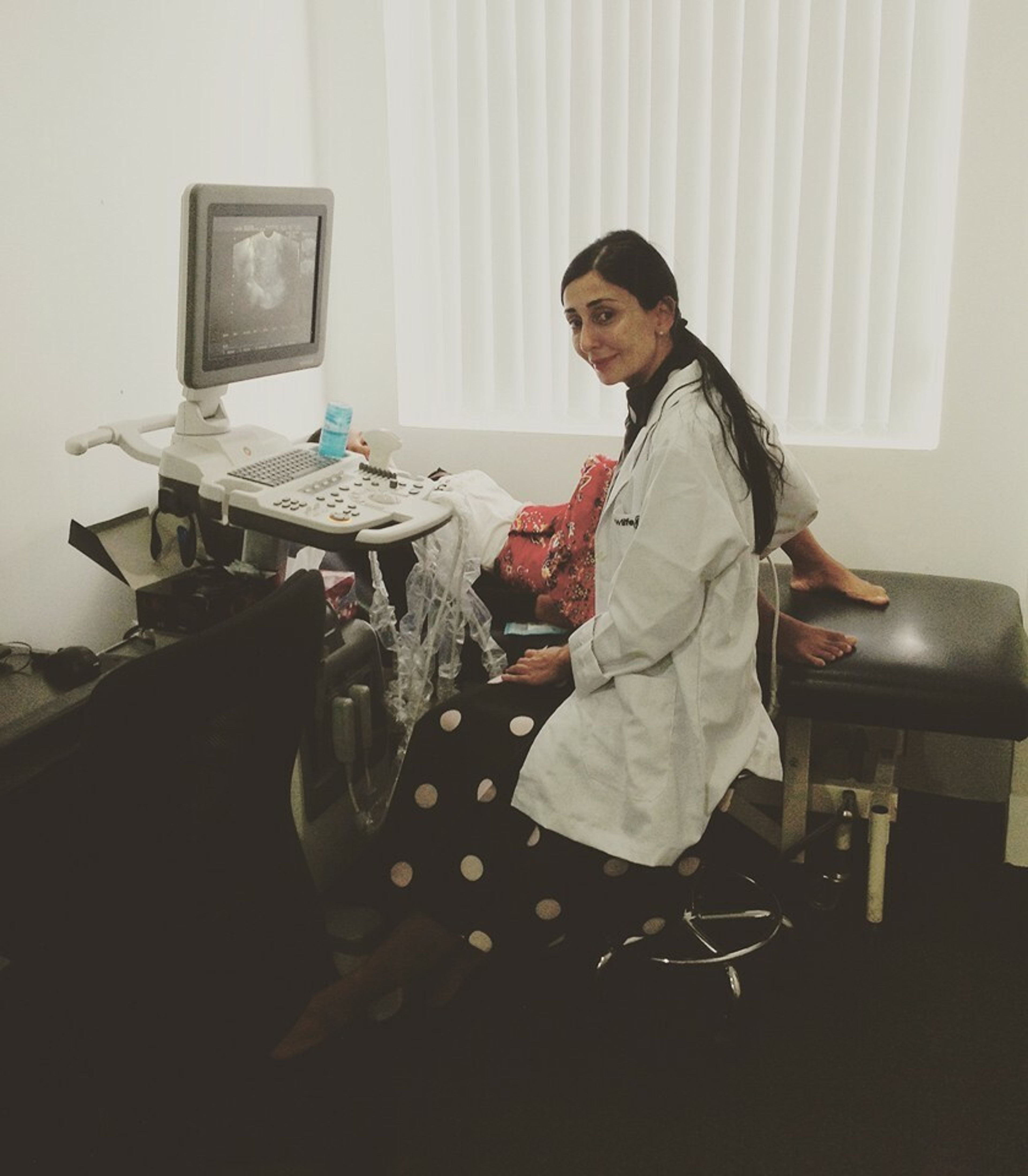
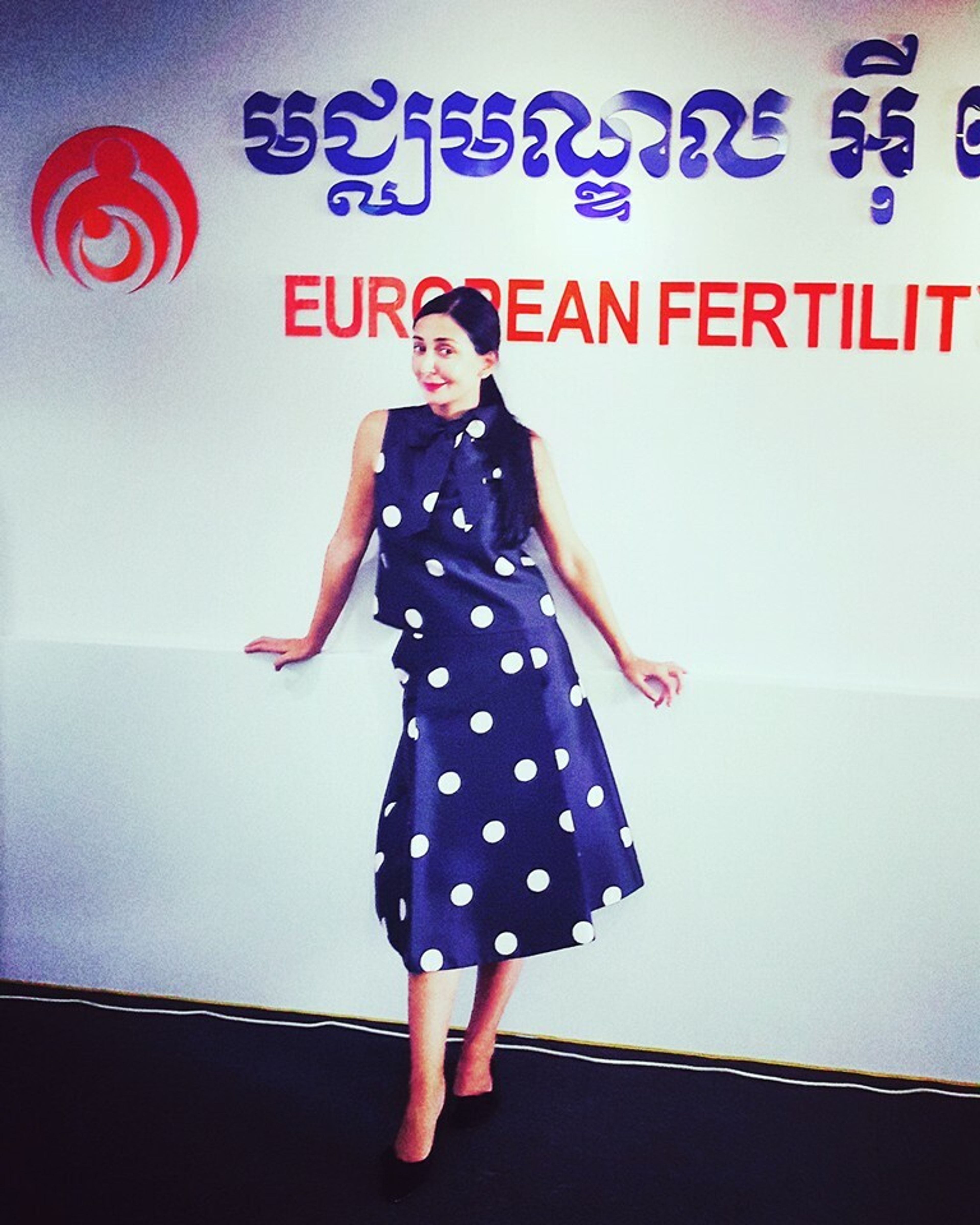
New Life fired off panicked emails to customers waiting nervously outside Cambodia, wondering what the government’s crackdown on surrogacy would mean for them. In one, apparently leaked to the Phnom Penh Post, New Life bosses allegedly advised local staff to delete their work email accounts. Another apparent email from New Life said its clients’ surrogacy contracts would be amended so as to remove reference to sums to be paid to surrogates.
Other media reports alleged that New Life cut contact with surrogates and commissioning parents. “Everything went into shutdown. Clinics took files and put them into hiding, just in case,” New Life customer Josephine Leonardo told a newspaper in Adelaide, Australia. “They did the right thing by the intended parents until it could be resolved.”
Although Kukunashvili announced that New Life would begin winding down operations in Cambodia in 2016, Pikani’s IVF clinic business operated legally in Cambodia and remained in business.
Despite the police crackdown, in early 2018 staff at this Central Hospital clinic continued to transfer embryos into Cambodian women who had been recruited by another surrogacy agency unconnected to New Life to act as surrogates for commissioning parents from overseas, according to testimony gathered by reporters.
Two women who had been garment factory workers on the outskirts of Phnom Penh told them that, in 2018, they chose to sign up as surrogates – not knowing that this decision would backfire dramatically. They said they did not know what agency they were working with and never received contracts. Subsequent reporting has since linked some of the arrested women to a surrogacy agency registered in the British Virgin Islands.
Khun Daneth, now 31, and Chheng Phalla, 40, both recall being driven to have surrogacy tests and procedures at the Central Hospital clinic, once New Life’s official Cambodia partner, where they each had an embryo transferred to their uteruses and received a payment of $500 – equivalent to about two months’ pay for a garment factory worker.
There followed further payments of $300 a month, while a much larger sum was promised at the end of the pregnancy, on delivery of the baby.
Daneth recalls “[I thought] if it is successful, I will have a business that I enjoy and own. I could pay some debt, too. Then I can move back to my home town.”
On 21 June 2018, police arrested Daneth and Phalla, along with 30 other surrogates, and charged them with child trafficking on suspicion that they intended to sell their children to overseas buyers. Xu Wenjun, the gay Chinese father of the child Daneth was carrying, was also arrested on trafficking offences. There is no suggestion that New Life had anything to do with these surrogacies.
Both eventually gave birth while in detention. Phalla’s labour came on so rapidly that there was no time for an ambulance to take her from the police hospital where the women were held, so she gave birth helped only by her fellow inmate surrogates.
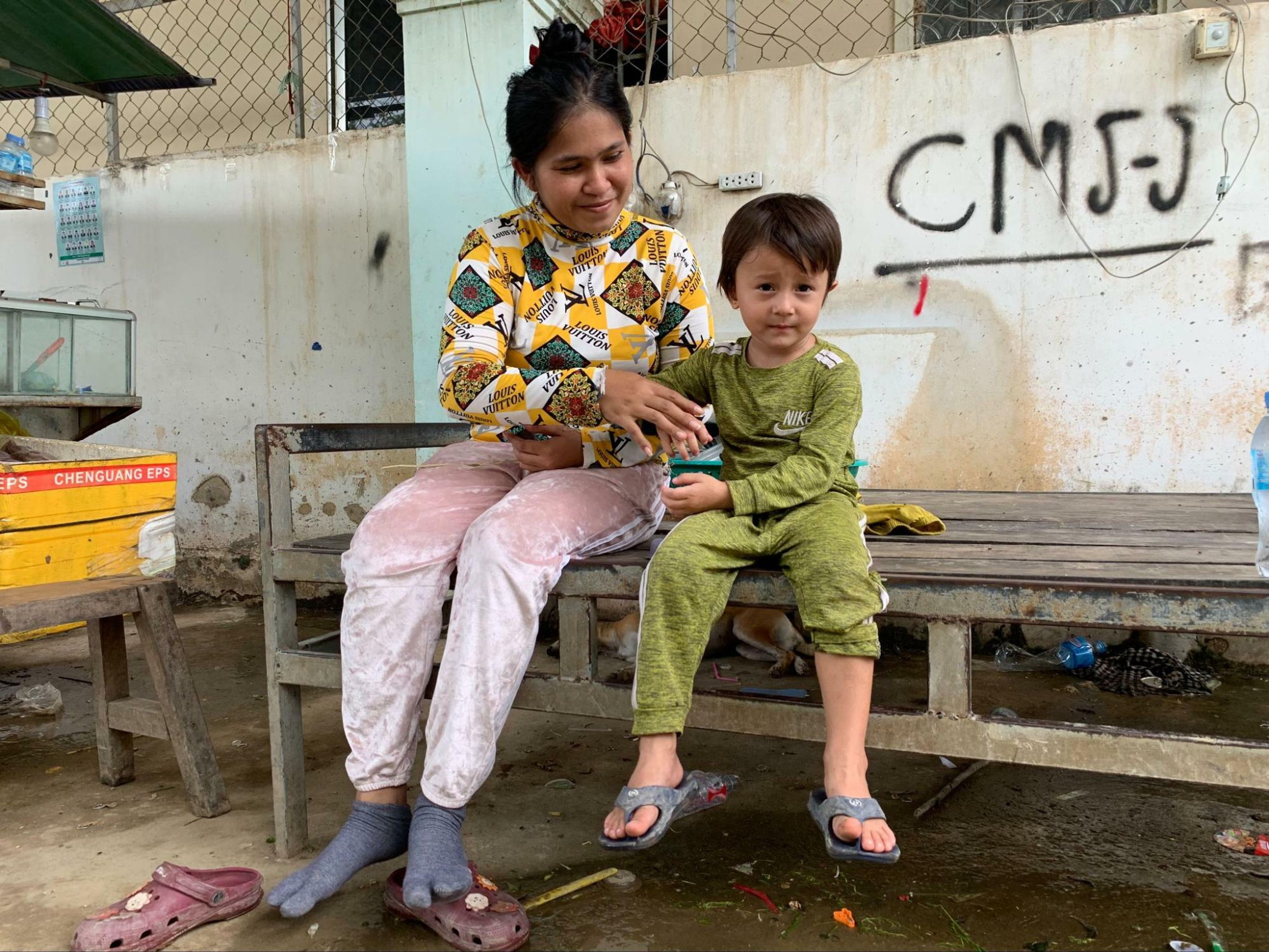
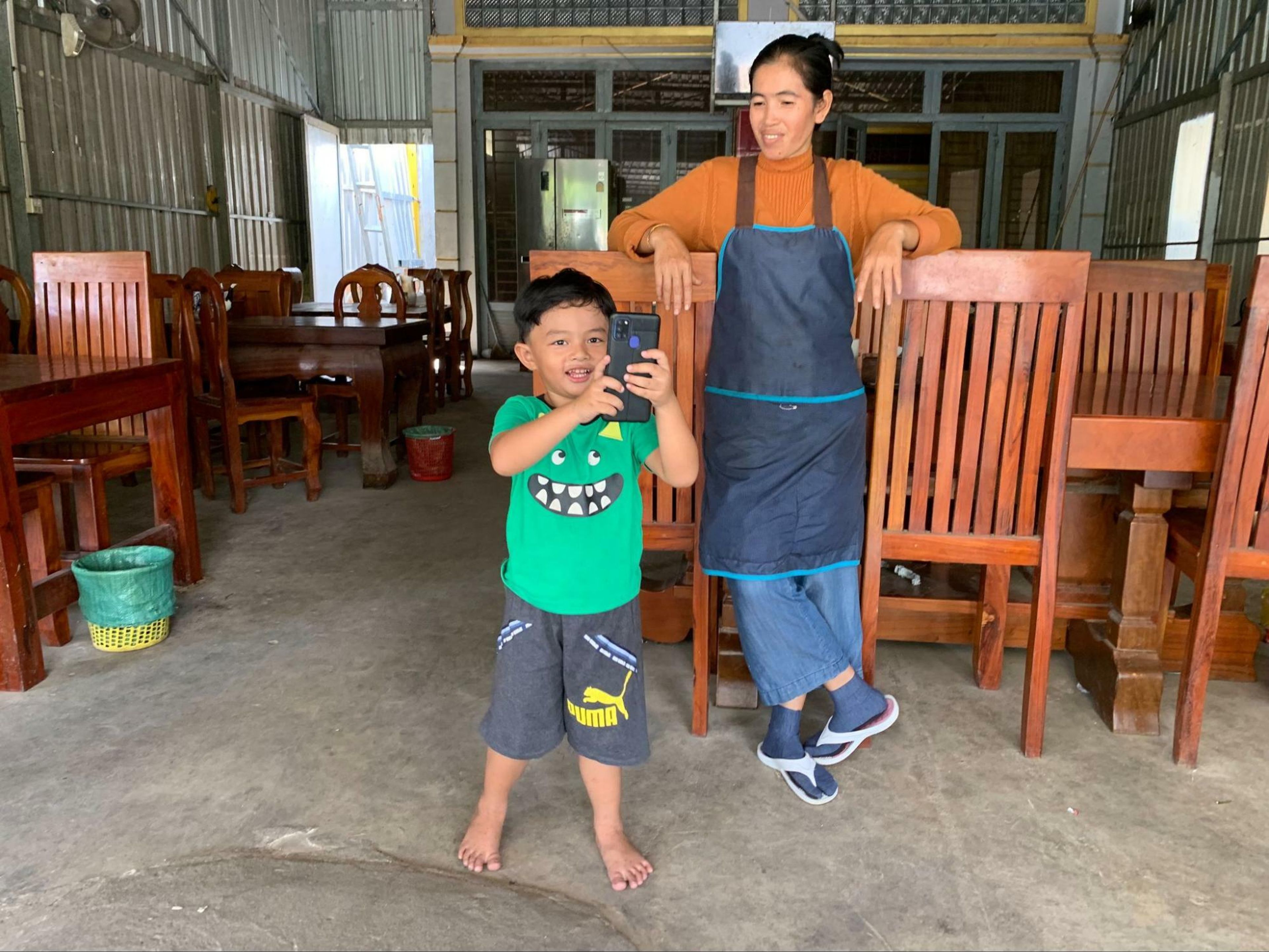
Eventually, Daneth and Phalla were released with suspended prison terms after pledging not to give away the children they gave birth to. Xu, the commissioning father, is still in jail, serving a 15-year sentence.
According to a recent investigation by the New York Times, Staff at the clinic had reportedly filed paperwork stating that all IVF procedures carried out were for Cambodian women struggling to become mothers, even though it was clear that many of the women were surrogates.
New Life is no longer active in Cambodia, and Pikani’s Phnom Penh clinic eventually closed due to the coronavirus pandemic. David Bezhuashvili told reporters the agency had left because the local authorities had announced tighter restrictions. He added that New Life was no longer active in neighbouring Laos or anywhere in South-East Asia.
Despite this position, many of the agency’s promotional websites still advertise surrogacy services in these countries.
In particular, some continue to openly welcome gay dads, advising them of services offered in Kenya, Laos and Mexico. Of these, New Life said only the Mexican branch was still running.
Regulatory puzzle
Globally, the debate over how to best ensure surrogates’ safety is contentious, with no end in sight.
Some Roman Catholic organisations have joined with feminist groups to campaign for complete surrogacy bans and stricter limitations on fertility technology, which they see as spiralling out of control. On the other side, advocates of commercial surrogacy are impatient to see existing laws liberalised and regulations that protect surrogates’ interests introduced, arguing that bans are paternalistic, ineffective and merely outsource surrogacy to markets where it is riskier for both the gestational carriers and resulting babies.
Meanwhile, in wealthier countries throughout the Global North, lawmakers are struggling to keep pace with these new and controversial technologies. Consultations on law reform that have grinded on for years continued in Ireland, New Zealand, Belgium, the UK and elsewhere, but with little sign of a compromise emerging.
In the absence of regulatory consensus, companies such as New Life will continue to thrive.
“In the real world, international commercial surrogacy is not going to go away completely, ever,” said Gamble. “It exists, it’s well established. And we also need to deal with the consequences of that.”
* This investigation was inspired by the award-winning work of Naipanoi Lepapa who in 2020/21 worked with many surrogates in Kenya to understand the issues they faced there more broadly.
* Contributors to the collaboration: Martin Laine, Holger Roonemaa, Shanti Das, Tania L Montalvo, Dalila Sarabia, Naipanoi Lepapa, Nino Bakradze, Natuki Mikhelidze, Purity Mukami, Leila Haddou, Ward Rihan, Vicheika Kann
* Fact-checking: Sarah Bancroft
* Artwork on main image: Florence Buckwell
* Editing: Ted Jeory and Nick Mathiason